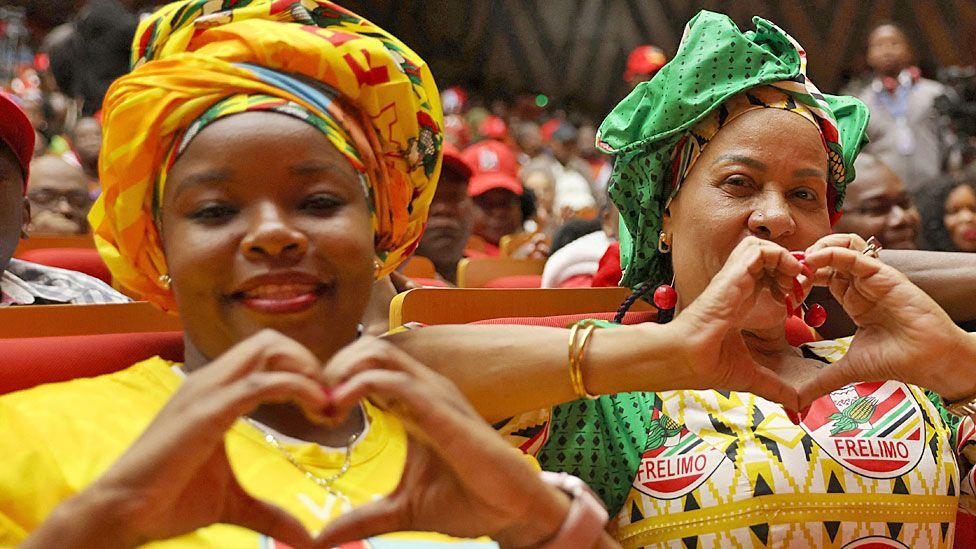Mozambique stands on the brink of a pivotal election that signals the end of an era, as the nation prepares to usher in a new leadership dynamic with the potential to reshape its political landscape. For the first time, the ruling Frelimo party will present a presidential candidate, Daniel Chapo, who was born after the country’s hard-fought independence from Portuguese colonial rule. Chapo, a 47-year-old hopeful, is seen as a beacon of hope for many disillusioned voters tired of the Frelimo party’s 49 years in power. The upcoming elections, set to encompass presidential, parliamentary, and gubernatorial races, come amid a backdrop of political discontent, as noted by political commentator Charles Mangwiro, who highlights that campaign representatives from Frelimo have faced open hostility in some regions.
The current president, Filipe Nyusi, is stepping down after two terms, aiming to pass the leadership baton to Chapo amidst a challenging political climate scarred by corruption, most notably the “tuna bond” scandal that severely impacted Mozambique’s economy. In light of these issues, Chapo’s image as an honest leader who represents a fresh start appears to resonate with the electorate, as evidenced by his successful campaign rallies that attract large crowds and enthusiastic support. However, critics remain skeptical, particularly human rights activist Mirna Chitsungo, who questions whether Chapo can truly instigate change within a party that has long been mired in corruption, highlighting the difficult path he faces to earn the trust of voters.
Compounding the challenges are allegations of electoral fraud, with concerns raised over the integrity of the voter registration process. The Centro de Integridade Pública has reported that approximately 5% of names on the voter rolls could be fictitious, contributing to an inflated voter count that may hinder the legitimacy of the election. With around 900,000 potential “ghost voters” identified, particularly in Frelimo-aligned regions, the stakes of ensuring a fair election are critical. This alarming situation raises questions not only about the fairness of the elections but also about the officials’ claims that the process will remain transparent and democratic, thus heightening public scrutiny and concern.
Chapo is facing significant competition from candidates vying for the presidency, including Venâncio Mondlane, an independent candidate, and Ossufo Momade, leader of the main opposition party Renamo. Mondlane has emerged as a notable contender, particularly among younger voters, with his campaign emphasizing national pride and challenging the status quo. His departure from Renamo and independent candidacy has revitalized interest among constituents who feel disenfranchised by the traditional political narrative. Meanwhile, Momade is attempting to solidify support from the Renamo base, which was significantly impacted by his predecessor’s leadership and the tumultuous history of the civil war, raising the potential for a divided opposition vote.
With a deep-rooted desire for reform, Chapo has been proactive in his campaign, even securing resources and support from the Mozambican diaspora in South Africa. His international outreach underscores the urgency and significance he places on winning the election as a platform for revitalizing Mozambique after decades of struggle and stagnation. However, as the campaign unfolds, analysts acknowledge that broader societal issues, such as economic instability—afflicting nearly two-thirds of the population who live below the extreme poverty line—pose a daunting challenge not only for Chapo but for any presidential hopeful.
The rising threat of violence linked to the insurgency in Cabo Delgado may not be a dominant issue in this election cycle, but it remains a significant concern for the nation, overshadowing the election discourse. With foreign troops still deployed to counter the insurgency, the future president will ultimately need to navigate the complex dynamics involving economic growth, peace, and rebuilding public trust. As candidates complete their final mobilization efforts before the vote, the unpredictable nature of the election has left observers uncertain about the outcome, encapsulated by Mangwiro’s assertion that the race is simply “too close to call.” As Mozambique prepares to cast its votes, the implications of this election will resonate beyond its borders, symbolizing a crucial chapter in the nation’s quest for renewal and stability.

